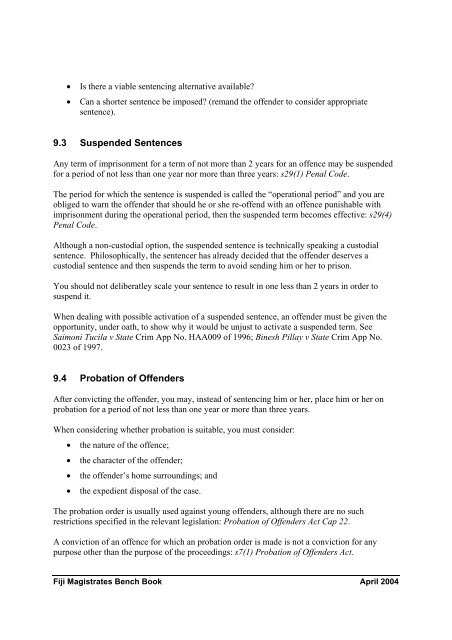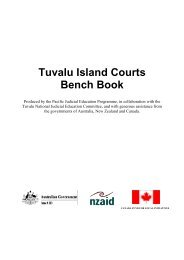Fiji Magistrates Bench Book - Federal Court of Australia
Fiji Magistrates Bench Book - Federal Court of Australia
Fiji Magistrates Bench Book - Federal Court of Australia
You also want an ePaper? Increase the reach of your titles
YUMPU automatically turns print PDFs into web optimized ePapers that Google loves.
• Is there a viable sentencing alternative available?<br />
• Can a shorter sentence be imposed? (remand the <strong>of</strong>fender to consider appropriate<br />
sentence).<br />
9.3 Suspended Sentences<br />
Any term <strong>of</strong> imprisonment for a term <strong>of</strong> not more than 2 years for an <strong>of</strong>fence may be suspended<br />
for a period <strong>of</strong> not less than one year nor more than three years: s29(1) Penal Code.<br />
The period for which the sentence is suspended is called the “operational period” and you are<br />
obliged to warn the <strong>of</strong>fender that should he or she re-<strong>of</strong>fend with an <strong>of</strong>fence punishable with<br />
imprisonment during the operational period, then the suspended term becomes effective: s29(4)<br />
Penal Code.<br />
Although a non-custodial option, the suspended sentence is technically speaking a custodial<br />
sentence. Philosophically, the sentencer has already decided that the <strong>of</strong>fender deserves a<br />
custodial sentence and then suspends the term to avoid sending him or her to prison.<br />
You should not deliberatley scale your sentence to result in one less than 2 years in order to<br />
suspend it.<br />
When dealing with possible activation <strong>of</strong> a suspended sentence, an <strong>of</strong>fender must be given the<br />
opportunity, under oath, to show why it would be unjust to activate a suspended term. See<br />
Saimoni Tucila v State Crim App No. HAA009 <strong>of</strong> 1996; Binesh Pillay v State Crim App No.<br />
0023 <strong>of</strong> 1997.<br />
9.4 Probation <strong>of</strong> Offenders<br />
After convicting the <strong>of</strong>fender, you may, instead <strong>of</strong> sentencing him or her, place him or her on<br />
probation for a period <strong>of</strong> not less than one year or more than three years.<br />
When considering whether probation is suitable, you must consider:<br />
• the nature <strong>of</strong> the <strong>of</strong>fence;<br />
• the character <strong>of</strong> the <strong>of</strong>fender;<br />
• the <strong>of</strong>fender’s home surroundings; and<br />
• the expedient disposal <strong>of</strong> the case.<br />
The probation order is usually used against young <strong>of</strong>fenders, although there are no such<br />
restrictions specified in the relevant legislation: Probation <strong>of</strong> Offenders Act Cap 22.<br />
A conviction <strong>of</strong> an <strong>of</strong>fence for which an probation order is made is not a conviction for any<br />
purpose other than the purpose <strong>of</strong> the proceedings: s7(1) Probation <strong>of</strong> Offenders Act.<br />
<strong>Fiji</strong> <strong>Magistrates</strong> <strong>Bench</strong> <strong>Book</strong> April 2004
















